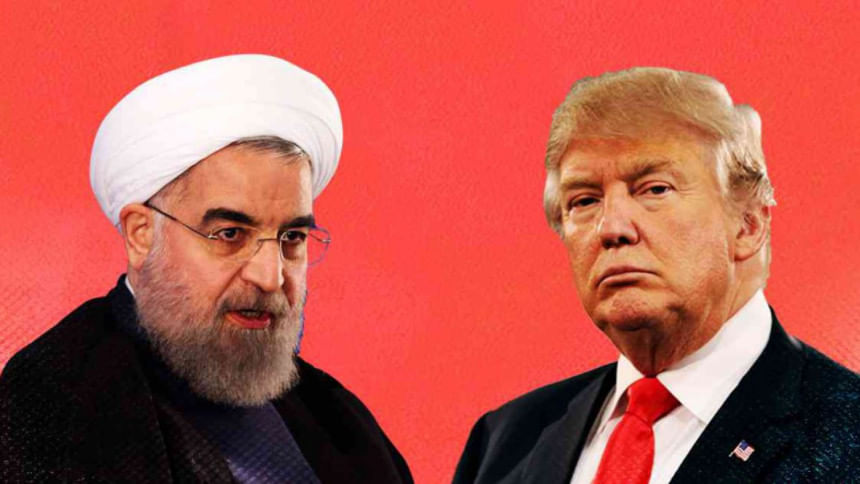Will the hawks in Washington win?

It is very apparent that President Trump is blowing hot and cold in the same breath on Iran. While one moment it seems that he has climbed down from his high horse on the Iran issue, the next moment he threatens Iran with dire consequences. His confusing stance indicates an ambiguous mind, his actions not a product of rational process of thought but of a mind pulverised by arrogance and clogged by preconceived notions about international issues, particularly Iran and the Middle East.
The most recent threat was issued last Sunday to the effect that "If Iran wants to fight, that will be the official end of Iran. Never threaten the United States again!" However, he displayed his abject ignorance of history, as he does so often on so many other issues, when he went on to add that the US never loses a war.
Scrambling through the pages of history since the end of the Second World War, one cannot find a single major war that the US can claim victory in, save for the first Gulf War. Every other major military venture that it had embarked on has ended in unmitigated disaster. It is still counting the costs of its misadventure in Iraq which has gone on longer than any other in recent history. After 17 years, the country is still in a flux with the increasing potential of breaking up in three parts. And after 15 years, trillions of dollars spent and uncounted deaths of civilians, more than 50 percent of Afghanistan remains under Taliban control.
Reportedly, President Trump was not too pleased with his two cabinet members, known to be hawks with a pathological dislike for Iran, to have given the world the impression that the US is raring for a war with Iran. However, the fact is that it is not only the impression but the reality of things too. Regime change in Iran has been the single most important objective of Trump since his assuming office. But initially, the foreign and defence portfolios were headed by moderate rational-minded persons in James Mattis and Rex Tillerson, both being against Trump's idea of a hostile Middle East policy which they rightly considered would be counterproductive, or picking on Iran or changing the status quo. And any rational mind would suggest exactly that. As it is, the US had enough on its hand to contend with, without adding Iran to the list. Consequently, they were shown the door.
Induction of Bolton and Pompeo as the national security adviser and the secretary of state, respectively, was no surprise, particularly of Bolton, the main provocateur of the Iraq War. Bolton has never made a secret of his intentions—and with him he has a steadfast protagonist of a hardline policy, the secretary of state Pompeo. The anti-Iran psyche has driven Trump's Middle East policy, heavily influenced by a most ribald pro-Israeli US lobby headed by President Trump's own son-in-law Jared Kushner. That, and the Israeli aim to see an end to Iran's nuclear capability, and therefore a regime change, dovetail so smoothly.
Both Bolton and Pompeo favour economic pressure to force the regime in Tehran to capitulate, as was done by Reagan with the erstwhile USSR, by manipulating the oil market in such a manner as to have brought down the price of oil to such a low as to make it uneconomical for the Soviets to sell oil.
The first step in Trump's effort to bring down the government in Tehran was to abrogate the nuclear treaty signed in 2015. The treaty was the result of a hard and long-drawn negotiation between Iran and the P5, and that was done away with utmost haste despite the views of the other signatories and the UN that Iran has never been, and is not, in breach of the terms of the agreement. This was done to create grounds for imposing sanctions on Iran, hoping that sanctions would have the necessary effect of forcing the people of Iran to rise up against the Islamic regime in Tehran. And the re-imposition of sanctions on Iran was the last nail in the coffin of any future understanding. This has given the hardliners in Iran an opportunity to push their case.
Sanctions do have their effects, but they can be counterproductive too for the party that has imposed it. Apparently, the expected consequences of sanctions on Iran did not materialise, which, for Trump, was disappointing. The beating of the war conch by the US is an indication, hoping to be provocative enough to egg Iran on to resort to precipitate actions. And that would be excuse enough for the war-mongering triumvirate in Washington to launch a preemptive strike on the excuse of "self-defence".
The US has done its utmost to provoke Iran since re-imposition of US sanctions in different ways. Recently, it deployed an aircraft carrier fleet in the Persian Gulf and stealth and B-52 bombers in the region. But before that, it took the most unprecedented step of declaring the Islamic Revolutionary Guard Corps as a terrorist organisation, only to have Iran riposte likewise, which termed the US Central Command in the Middle East or CENTCOM as a terrorist organisation. And that Israel is in cahoots with the US in pushing hard against Iran has been exposed in Netanyahu's greasy compliments to Trump: "Once again you are keeping the world safe from Iran aggression and terrorism."
Viewing the recent developments between US and Iran, one cannot but have a feeling of déjà vu. The fabrication of false excuses against Iraq to create grounds for invasion is being reenacted in the case of Iran—and before that, the Gulf of Tonkin incident that Lyndon Johnson used to escalate the Vietnam conflict. Throwing accusations against Iran of sabotaging oil tankers in the Gulf without providing any substantive evidence reminds one of the manufactured intelligence about Iraq possessing WMDs. Iran moving missiles in civilian ships is another such story making the rounds.
Can the US claim a moral high ground and accuse Iran of supporting terrorism, an allegation that would come in handy as an excuse for attacking Iran? The US can be accused of doing the same thing in the Middle East to support its allies.
The US has embarked on a dangerous game in the Middle East which can lead to unintended consequences and engulf the region in another catastrophe. It would do well to remember that while it is within the power of the US to start a war, it will not be within its capacity to call a halt to it, a truth it should have learnt from its Iraq misadventure.
It is rather cynical to hold a gun at the head of your opponent and call him to reach out first, as President Trump is doing. The present situation is the deliberate making of an ill-advised policy, and the ball is firmly in Trump's court. One hopes that the saner elements in Washington and in the US Congress would see the dangers of the current Iran policy, and prevent Trump from making a blunder with imponderable consequences. The hawks must not be allowed to win.
Brig Gen Shahedul Anam Khan, ndc, psc (retd) is Associate Editor, The Daily Star.

 For all latest news, follow The Daily Star's Google News channel.
For all latest news, follow The Daily Star's Google News channel. 



Comments